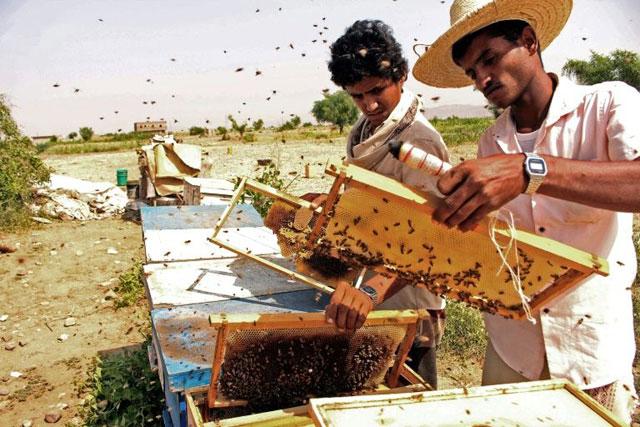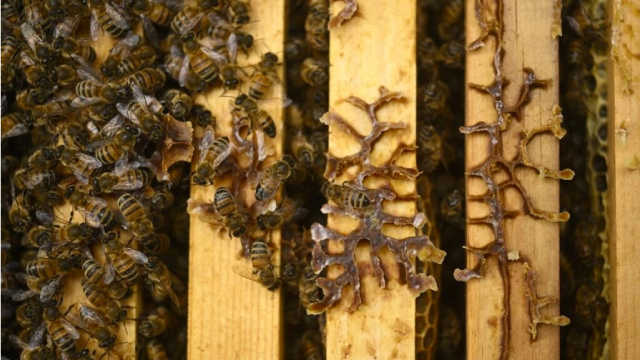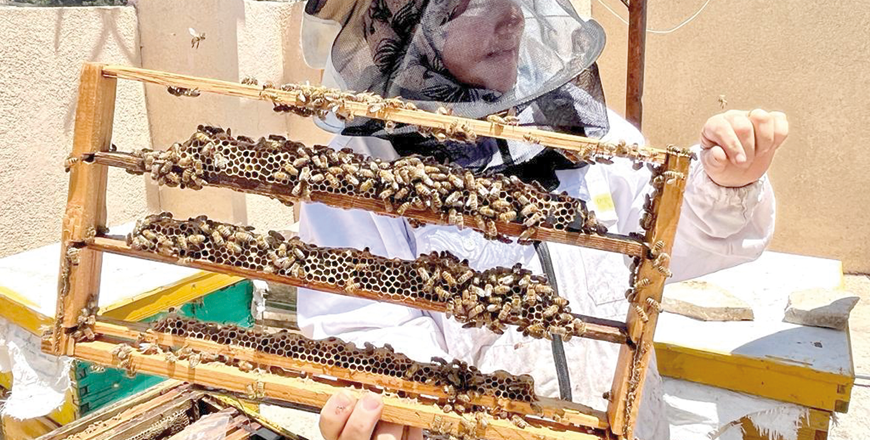You are here
Tough times for Yemen honey trade as war drags on
By AFP - Nov 24,2019 - Last updated at Nov 24,2019

Beekeepers at work producing 'Yemen's gold' in Hajjah province (AFP photo)
ASLAM, Yemen — Mohammed Manea has tended honey bees northeast of Sanaa for years, but despairs that the production of "Yemen's gold" is under threat as the war engulfing the country drags on.
The conflict has blighted millions of lives and brought the economy to the brink of collapse. Cottage industries such as beekeeping, coffee growing and artisan manufacturing have been hit particularly hard.
Beekeepers say clashes between the Saudi-supported government and Iran-backed rebels, alongside a humanitarian crisis that the United Nations has called the world's worst, have throttled their livelihoods.
"When we recently arrived in this part of Hajjah province on the front line between the aggressors [the Saudi-led coalition] and the Houthis, the trucks were hit by an air strike," Manea told AFP.
"One was carrying the honey, and the other was carrying the bees," he added as he used his bare hands to remove a honeycomb frame crawling with bees from a hive in the rural region of Aslam.
Yemen is renowned for its Sidr honey, named after the tree from which the nectar is gathered. The honey is referred to informally as "Middle Eastern manuka", a bow to its famed market rival from New Zealand.
Sidr honey is said to have medicinal properties and is a bestseller in the souks and bazaars of the Gulf where it retails at a premium.
It is also a natural product that is traditionally recommended to new mothers to augment breast milk production.
Manea's fellow beekeeper, Ali Kabsh, agreed that the business was suffering badly.
"Honey production has dropped," he said pointing to the challenges of exporting during wartime and the logistical difficulties of keeping bees.
He estimated that the number of hives had dropped from between 800 and 1,000 when the war broke out in 2014 to between 100 and 150 currently. There are no official statistics that highlight the full damage suffered by the country's once proud producers of honey.
Kabsh said that among the most significant problems he faced was travelling to find fresh flowers in bloom for his bees to harvest the nectar.
"A beekeeper's work depends on the seasons. Each region has its flowering season — so they have to move around to produce the honey," he told AFP.
In Abs, another region in Hajjah province, beekeeper Ahmed Ali Al Adili said he had struggled to export honey to Gulf states including Saudi Arabia.
The international airport in the capital Sanaa is under Houthi control and remains dormant, while most border crossings are closed, he said.
"My production has decreased by 90 per cent," Adili said.
Other traditional trades in Yemen have also suffered. The Al Shinayni market in third city Taez once overflowed with handicrafts, including products made by blacksmiths, potters and tailors. Now it is an arms bazaar in which a Kalashnikov assault rifle retails for little more than $1,000.
Tens of thousands of people, mostly civilians, have been killed since the Saudi-led military coalition intervened in the conflict to support the internationally-recognised government against the Houthis.
Related Articles
AMMAN — The Jordanian Beekeepers Union urged the government on Monday to exempt locally-produced honey from a newly imposed 16 per cent sale
QUIMPER, France — Bees pollinate 71 of the 100 crop species that provide 90 per cent of food worldwide.
JERASH — Around 48km north of Amman in Jerash Governorate, Muna Manfalouti, a beekeeper for nearly four decades, lives a life emblematic of both the undying spirit for Jordanian women and the stark toll of climate change on a treasured trade.

















